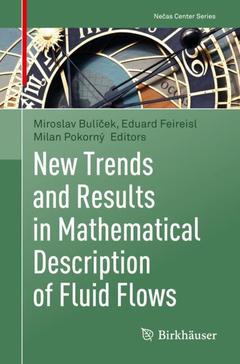Description
New Trends and Results in Mathematical Description of Fluid Flows, 1st ed. 2018
Nečas Center Series
Coordinators: Bulíček Miroslav, Feireisl Eduard, Pokorný Milan
Language: English
Support: Print on demand
Description
/li>Contents
/li>Biography
/li>Comment
/li>
The book presents recent results and new trends in the theory of fluid mechanics. Each of the four chapters focuses on a different problem in fluid flow accompanied by an overview of available older results.
The chapters are extended lecture notes from the ESSAM school "Mathematical Aspects of Fluid Flows" held in Kácov (Czech Republic) in May/June 2017.
The lectures were presented by Dominic Breit (Heriot-Watt University Edinburgh), Yann Brenier (École Polytechnique, Palaiseau), Pierre-Emmanuel Jabin (University of Maryland) and Christian Rohde (Universität Stuttgart), and cover various aspects of mathematical fluid mechanics ? from Euler equations, compressible Navier-Stokes equations and stochastic equations in fluid mechanics to equations describing two-phase flow; from the modeling and mathematical analysis of equations to numerical methods. Although the chapters feature relatively recent results, they are presented in a form accessible to PhD students in the field of mathematical fluid mechanics.- Miroslav Bulíček, Charles University, Prague
- Eduard Feireisl, Institute of Mathematics of the Czech Academy of Sciences, Prague
- Milan Pokorný, Charles University, Prague
Contains several recent results and reflects new trends in the theory of fluid mechanics
Each of the four chapters contain an overview of available older results
The material is presented in a form accessible for PhD students
These books may interest you

Fundamental Mechanics of Fluids 160.25 €



